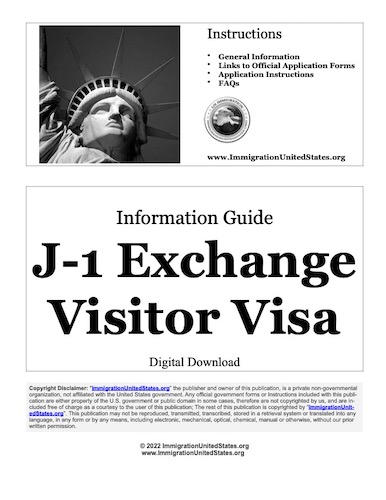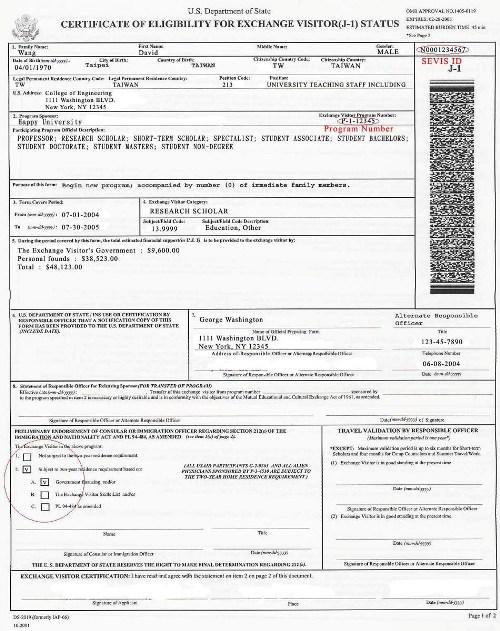| Instructions in Spanish | Instructions in Russian |
J-1 Exchange Visitor Visa
Overview of the Application Process for a J-1 Exchange Visitor Visa
| Procedure Name: | |
| Purpose: | J-1 visa is legally classified as a non-immigrant visa that allow to study in the Unites States for a specific period of time. Student visa is available for the academic and vocational study. To qualify a visa, an applicant must enroll in the qualified U.S. academic or vocational study. |
| Eligible Applicants: | J-1 is used to make a cultural exchange between the J-1 Visa holder and the U.S. organization that invites the visitor (schools, businesses, a variety of organizations and institutions). Individuals come to the United States as a student, scholar, teacher, professor, research assistant, medical graduate, or international visitor, they participate in a program of studies, training, research, or a cultural enrichment program.The J-1 sponsor is the agency that approves the applicant to take part in the J-1 program. |
| Validity/Expiration: | If your J-1 visa has expired and you do not travel outside of the U.S., there is no need to renew the visa. But if you travel outside of the United States during your current exchange visitor program and after your J-1 visa has expired, you must apply for a new J-1 visa in your home country in order to re-enter the United States to continue your exchange program. |
| Where to Apply: | Before you can apply at a U.S. Embassy or Consulate for a J-1 visa, you must first apply for and be accepted into an exchange visitor program through a designated sponsoring organization. Order and download this information guide online now to learn how to apply for a J-1 Exchange Visitor Visa Application. |
General information about a J-1 Visa Exchange
 The government of the United States issued J-1 visas to individuals who take part in a wide range of exchange programs sponsored by schools, businesses, and a variety of organizations and institutions. These programs are intended for business and industrial trainees, scholars, students, international visitors, teachers, research assistants and cultural missions. Additionally, there are many exchange programs for young people, including summer employment programs, programs for college student’s internship and au-pair programs.
The government of the United States issued J-1 visas to individuals who take part in a wide range of exchange programs sponsored by schools, businesses, and a variety of organizations and institutions. These programs are intended for business and industrial trainees, scholars, students, international visitors, teachers, research assistants and cultural missions. Additionally, there are many exchange programs for young people, including summer employment programs, programs for college student’s internship and au-pair programs.
Eligibility for Exchange Visitor Visa in the United States
You are eligible for a visa J-1 Exchange if you come to the United States as a student, scholar, trainee, teacher, professor, research assistant, medical graduate or international visitor participating in a program of study, research training or cultural enrichment program.
Exchange Visitors cannot travel on the Visa Waiver Program or with Visitor Visas
Exchange visitors who are citizens of Visa Waiver Program (VWP) participating countries are not permitted to travel without a visa on the VWP, if their purpose of travel is to participate in an exchange visitor program.
Exchange visitors are not permitted to travel on business/tourist (B-1/B-2) visas if their purpose is to participate in an exchange visitor program. All exchange visitors must travel to the United States with exchange visitor (J-1) visas.
The difference between the J-1 Exchange Visitor Visa and the F-1 Student Visa
Both visas allow students to study at U.S. higher education institutions (universities, colleges, academies), but there are key differences between them. J-1 Visas are for students participating in exchange visitors programs (study abroad programs between universities and government-to-government exchange programs). J-1 students may enroll in a degree/non-degree program at a U.S. higher education institution, participate in a student internship.
F-1 Visas are for students who want to complete a full course of study and obtain a degree. F-1 Visa is for general admittance into U.S. school.
How to Apply for a J-1 Visa Exchange Visitor?
- Apply for and be accepted into the Student Exchange Program.
Before you can apply at a U.S. Embassy or Consulate for a J-1 visa, you must first apply for and be accepted into an exchange visitor program through a designated sponsoring organization.
When you are accepted into the exchange visitor program you plan to participate in, you will be enrolled in the Student and Exchange Visitor Information System (SEVIS). Most J-1 Exchange Visitors must pay the SEVIS I-901 Fee.
- Complete the Online Visa Application
Complete the online visa application, Form DS-160 and print the application form confirmation page to bring to your interview. Upload your photo while completing the online Form DS-160.
- Schedule an Interview
Schedule an appointment for your visa interview, generally, at the U.S. Embassy or Consulate in the country of residence. You may schedule your interview at any U.S. Embassy or Consulate, but be aware that it may be difficult to qualify for a visa outside of your place of permanent residence.
- Prepare for the Interview
Pay the non-refundable visa application fee. Note: U.S. government sponsors exchange visitor (J visa) applicants, they are not required to pay application processing fees if participating in a Department of State, a U.S. Agency for International Development (USAID), or a Federally funded educational and cultural exchange program which has a program serial number beginning with G-1, G-2, G-3, or G-7 printed on Form DS-2019, Certificate of Eligibility for Exchange Visitor Status.
- Gather and prepare the following required documents before your visa interview:
- Your passport must be valid for at least six months beyond your period of stay in the United States.
- Nonimmigrant Visa Application,Form DS-160 confirmation page
- Application fee payment receipt,if you are required to pay before your interview
- Photo
- Certificate of Eligibility for Exchange Visitor Status, Form DS-2019– A SEVIS-generated Form DS-2019 is provided to you by your program sponsor after the sponsor enters your information in the SEVIS system. All exchange visitors, including their spouses and minor children, must be registered in the Student and Exchange Visitor Information System (SEVIS). Each person receives a separate Form DS-2019.
- Training/Internship Placement Plan, Form DS-7002– In addition to the Form DS 2019, participants in the J-1 Trainee and Intern categories require Form DS-7002 (based on Box 7 on Form DS-2019).
At the interview, a Consular officer may ask you for additional requested documents that include evidence of:
- The purpose of your travel;
- Your intent to depart the United States after your travel;
- Your ability to pay all travel costs; and/or
- Other documents the consular officer may request.
- Attend Your Visa Interview
During your visa interview, a consular officer will determine whether you are qualified to receive a visa. When the visa is approved, you will be informed how your passport with visa will be returned to you.
After two years at the end of your exchange visitor program you will be required to leave the United States and return to the country of residence.
This page can be found on: https://www.usimmigrationapplication.org/visas/j1-exchange-visa
Information and Instructions about the J-1 Exchange Visitor Visa included in this immigration guide:
- What is a J-1 Visa?
- What is the difference between the J-1 Exchange Visitor Visa and the F-1 Student Visa?
- What is the Exchange Visitor Program?
- What types of programs qualify under the J-1 Visa?
- Can I enter the United States more than 30 days in advance?
- How to apply for J-1 Visa?
- What are the opportunities for visa extension?
- How to prepare the application forms?
- How to change your status to J-1, if you are already in the U.S.?
- If I travel outside of the United States during my current exchange visitor program and after my J-1 visa has expired, should I apply for a new J-1 visa in the home country in order to re-enter the United States to continue your exchange program?
- Can I bring my relatives with me to the U.S.?
J-1 Exchange Visitor Visa Application Related Forms
- Frequent questions
- List of necessary documents
- List of embassies and consulates of the United States
- National list of USCIS offices
- List of embassies and consulates of the United States
- DS-160, Online Nonimmigrant Visa Application
- DS-2019 Online Visa Application
Disclaimer: We are not affiliated with the government, we are a private publisher of information guides. This product only includes instructions, it does not include filing fees, or any other charges to submit your application.


